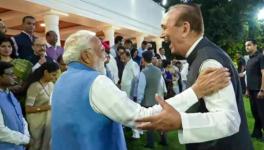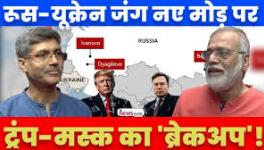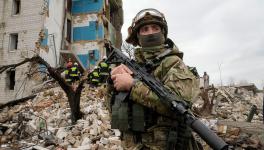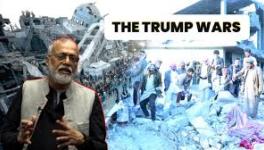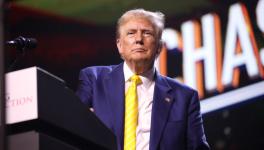Belarus: Scramble for Heart of Europe
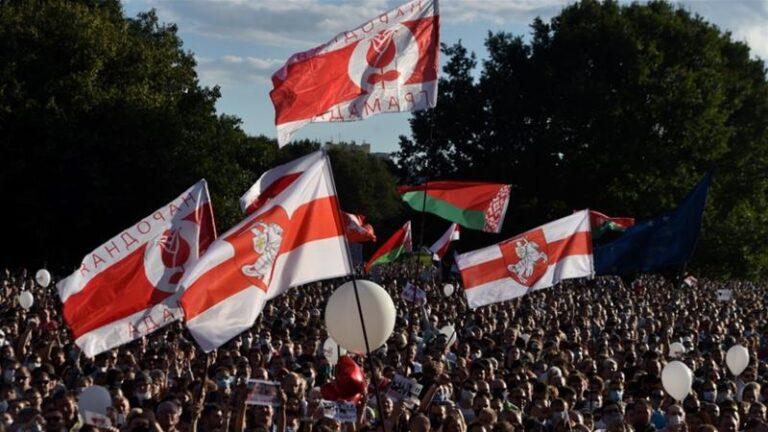
An opposition campaign rally in Minsk, July 30, 2020
The Secretary of State in the George W. Bush administration Condoleeza Rice once described Belarus as “the last true remaining dictatorship in the heart of Europe.” She held out the assurance that it was “time for change to come to Belarus.” That was during her visit to next-door Lithuania in April 2005. Fifteen years have passed. Rice’s promise is yet to be realised. Is the Trump administration following up?
By all indications, change is in the air in Belarus. For good or bad — one cannot tell — the ground beneath the feet of the Belarus strongman President Alexander Lukashenka is shifting, finally, after an uninterrupted rule since 1994 through a 26-year period following the dissolution of the former Soviet Union in 1991. Belarus under Lukashenko preserved the former Soviet system in the westernmost edge of the extinct empire — no oligarchs, state-owned industry, stable employment and social security but economic stagnation and repressive state security apparatus.
Historically, it has been customary for Lukashenka to get re-elected with a minimum of 90 percent support of the people. The world community largely acquiesced with his mandates, the citizens of Belarus meekly submitted to it and, most important, Russia underwrote its legitimacy. But all that is changing dramatically as Lukashenka approaches the presidential election on August 9 seeking yet another term.
Lukashenka is very obviously unpopular and as the elections approached, he resorted to time-tested strong-arm tactics — arresting his rivals and preparing to fiddle the results. However, the electoral cycle appears to be genuinely contested this time around.
The dwindling popular support for Lukashenka is sticking out grotesquely, especially among the middle class, as people began coming out in tens of thousands in support of persecuted opposition candidates despite the repressive crackdown in the last month; and, curiously, challengers have appeared from outside the established opposition circles whose mentors and minders are yet unclear. The fear of the dictator is dissipating, which always introduces an inflection point. Ominously enough, the US government media and the social media networks are moulding a new narrative, too.
Amidst all this, on July 29, Belarus authorities detained thirty-three Russian citizens suspected of plotting mass unrest. The Belarusian Foreign Ministry summoned the Russian envoy and the Ukrainian charge d’affairs, “given the confirmed information that some of those in custody had been previously involved in combat in the Donetsk and Lugansk regions of Ukraine.”
On August 1, Lukashenko disclosed that the detainees were “a first group from 180 to 200 people who were meant to be inserted into Belarus (from Russia)… They are soldiers. They were given orders and off they went. We have to deal with those who were giving orders and who were sending them in here… we have serious suspicions about the goals that the group set out.”
Minsk has alleged that the detained Russians were mercenaries belonging to the Wagner Group, a shadowy Russian private military company credited with links to the Kremlin leadership that has been active in the so-called hybrid wars in Syria, Libya, Sudan, Ukraine (Crimea and Donbas), etc. Minsk said they are suspected of masterminding mass unrest.
Moscow’s low-key response was dismissive of Minsk’s allegation, claiming that the group of Russian men was travelling to Istanbul, with a transit stopover in Minsk, and that they had all the required papers, including air tickets to their ultimate destination. Belarus’ Investigation Committee contradicted this claim.
Lukashenko’s intentions are not clear, either. Perhaps, he will try to use the detained Wagner fighters as an excuse for further crackdowns. To be sure, Belarus-Russia ties have come under strain. The fault lines have surfaced.
Since 2014, Lukashenka has been marking distance from Russia and warding off Moscow’s substantial pressure to nudge him toward a closer foreign and security policy and to integrate the two countries per their 1999 Unity pact. A determined attempt by President Putin personally last December at a one-on-one at Sochi also failed to persuade Lukashenka, much to the Kremlin’s chagrin and embarrassment.
Unsurprisingly, sensing that that Belarus-Russia relations were fraying, Washington soon began courting Lukashenko. The US Secretary of State Mike Pompeo visited Minsk on February 1 to discuss with Lukashenko a road map of cooperation to encourage the latter to assert Belarus’ national sovereignty and independence from Russia.
The latest developments make Belarus a frontline state in the US-Russia rivalry. Clearly, the August 9 elections will impact not only the domestic politics of Belarus but the trajectory of the US-Russia rivalry and, in turn, will have consequences for European security also. Washington encourages Lukashenka to navigate Belarus as an independent actor in the NATO-Russia security dynamics in the Baltics. This needs explaining.
Belarus’ geography is critical to the security of the so-called Suwalki Gap, the narrow corridor that connects the Baltic States to Poland and the rest of NATO, which also provides indirect access for Russia (via Belarus) to its exclave of Kaliningrad, a hugely strategic outpost on the Baltics. No doubt, Suwalki Gap is regarded as one of the most dangerous “contact lines” between NATO and Russia.
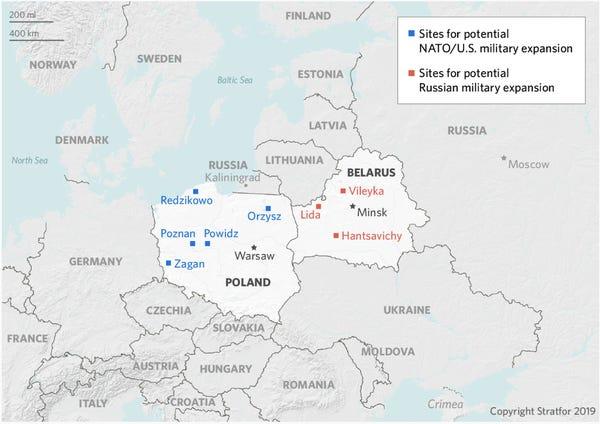
The Suwalki Gap is a narrow strip of just 100 kms that constitutes the Poland-Lithuania border while it is also providing the only land corridor between Kaliningrad and Belarus. Conceivably, a Russian attack to capture the Suwalki Gap would cut off NATO’s access to the Baltic States while on the contrary a seizure of Suwalki Gap in a NATO manoeuvre would severe Russia’s access to Kaliningrad and establish the alliance’s dominance in the region. Therefore, for Moscow — and, equally, for NATO — Kaliningrad’s vulnerability is the Achilles heel of Russia’s national security. (Russia’s biggest-ever military exercise in 2017 codenamed Zapad simulated a conflict for control of Suwalki Gap, which followed the landmark 2016 NATO deployments to Poland and the Baltics, contrary to previous assurances given to Russia.)
Until the US-backed regime change in Ukraine in 2014 phenomenally altered the security calculus in Eurasia and Russia’s ties with the West nosedived, Belarus used to be Russia’s “sleeping partner” in Europe. Suffice to say, the geopolitics of Belarus becomes crucial today in the context of the increasingly confrontational NATO-Russia and US-Russia relationship and the military build-up in the region. It is entirely conceivable that a political crisis in Belarus could transform as likely trigger of a NATO-Russia confrontation.
Since 2014, Lukashenka began distancing from the Russian actions in Ukraine with a view to reposition Belarus as a neutral presence in Eastern Europe. Thus, Belarus began probing closer ties with NATO. In February, Belarus and the British Royal Marines held a bilateral training exercise less than 50 kms from the Russian border. Without doubt, Moscow took note. Curiously, the main thrust of Belarus’ revised military doctrine prioritises resistance to a Russian-backed intervention. Lukashenka has been resisting for past few years Moscow’s proposal to establish an air base in Belarus (although Belarus is de facto responsible for the defence of several hundreds of kilometres of air space to the west of Moscow.)
Having said that, Belarus’ heavy dependence on Russia delimits Lukashenka’s space to manoeuvre. Belarus is a beneficiary of heavily subsidised Russian supplies of oil and gas; 70% of Belarus’ external financing comes from Russia; almost half of Belarus’ foreign trade is with Russia. To be sure, Moscow has lately begun leveraging its economic support to force Belarus to move towards closer integration of Union States, as envisaged under the 1999 pact — known as the Treaty on the Creation of a Union State of Russia and Belarus signed in Moscow by then Russian President Boris Yeltsin and Lukashenko on December 9.
Lukashenka’s resistance to Russian pressure also reflects the popular opinion in Belarus that militates against the country’s integration with Russia (which will significantly undermine its national sovereignty.) But his near-term dilemma is that a big chunk of Belarus industry forms part of value chains inherited from the integrated Soviet economy devolving upon energy supplied from Russia and export markets in Russia.
Therefore, Lukashenka is constrained to follow a pragmatic line in the absence of a reliable lifeline forthcoming from the West, which is keeping a wary distance from him so far. Of late, he has agreed to restart integration talks with Russia in September or October. But how far Moscow will pile pressure for integration and how far Lukashenka can afford to resist Russian pressure will largely depend on the outcome of the August 9 elections. Above all, amidst the new volatility in Belarus politics, there is no certainty anymore that Lukashenka can impose a decision on integration with Russia on an irate nation.
The strong likelihood is that Lukashenka will ensure his victory in the elections on August 9. But the big question is: What happens thereafter? The probability is high that public protests may ensue. Equally, Lukashenka’s instinct will be to crush the demonstrations. Will Moscow intervene in such an eventuality? Washington is monitoring closely. Any unilateral Russian intervention in Belarus would become grist to the Washington establishment’s mill to caricature “revanchist Russia”, to demonise Putin and to drive another wedge between Europe and Russia.
From present indications, Moscow’s preference will be for a pragmatic approach. Meanwhile, all this is unfolding while politics within Russia has also become animated lately following large scale demonstrations in Khabarovsk city on the Chinese border, the jewel of the Russian Far East, for several weeks with a growing “anti-Putin” tilt, which has spread to Moscow and St. Petersburg.
Therefore, when it comes to Belarus, the challenge for Moscow lies in cautiously speeding up the Union State integration without risking Lukashenka’s domestic position, lest the Belarussian public perceived integration as total capitulation by him. Moscow’s priority could be primarily focused on the security sphere at this juncture — establishment of a permanent military presence in Belarus, principally — to provide underpinnings to prevent a replay of the Maidan protests in Kiev in the chaotic December 2013-February 2014 period, which the CIA exploited to instal an anti-Russian government in power in Ukraine.
The “known unknown” today is what form the current protest demonstrations would take. For sure, the western intelligence is watching closely for opportunities to queer the pitch. A flashpoint comes if the demonstrations gather momentum and takes the form of a “colour revolution”, prompting Lukashenka to seek Russian support. Even if he doesn’t, there is always the possibility that Moscow may be compelled to take unilateral steps to secure its interests by way of covert intervention.
For, turmoil in Minsk will be viewed by Moscow as a national security crisis for Russia. Considering all that happened in Russia-Ukraine relations since 2014, Moscow simply cannot afford, from the national security perspective, to passively watch the emergence in Minsk of yet another unfriendly government supported by the US in the former Soviet republics.
With the Baltics and Ukraine in western sphere of influence already, if the US grabs Belarus, Russia’s defence lines to the west vis-a-vis NATO would collapse. In all likelihood, Belarus is turning into a classic bear trap for Russia in the great game in the heart of Europe — Moscow is damned if it acts in self-interest; it is damned if it does nothing.
Get the latest reports & analysis with people's perspective on Protests, movements & deep analytical videos, discussions of the current affairs in your Telegram app. Subscribe to NewsClick's Telegram channel & get Real-Time updates on stories, as they get published on our website.












